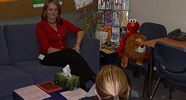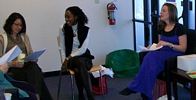The equipment available for deaf and hearing impaired people to use at home includes textphones, listening devices and alerting devices such as specially adapted doorbells and alarm clocks .
Equipment and Aids for Home and Work
Help is available with everyday situations involving telephones, textphones and listening equipment. Extra aids include induction loops which work with your hearing aid, alarms, alarm clocks, doorbells and teletext adapters.
You can get equipment and advice about the different types of aids available from social services, National Health Service audiology departments and voluntary organisations.
Telephone Aids
Devices to help you use the telephone include:
- handsets with inductive couplers
- amplifiers
- extension bells
- text display
Alarm clocks and watches
Alarm clocks for deaf or hard of hearing people can work in different ways. The key features for clocks are that they:
- vibrate under the pillow to alert the user
- have a flashing light
- have an extra loud sound alarm
You can also buy watches that vibrate.
Doorbells and equipment that alerts you to sounds in your home
As well as doorbells that alert you by a flashing light or a very loud ringing bell there are other multi-alerting systems that can be used to attract your attention to different sounds in your home, for example when the telephone rings.
Smoke alarms and fire safety
You can get smoke alarms that use strobed light and vibrating pads to warn you at the first sign of fire.
Vibrating-pad smoke alarms are specially fitted with a vibrating pad which are connected to the smoke alarm and can be placed under your pillow or mattress. The pad vibrates when the alarm is activated.
Strobe lights which are fitted to a smoke alarm will emit a flashing strobe light warning when the smoke alarm is activated.
Linked alarms are connected to all the other smoke alarms in the building, and ensure that if any one smoke smoke alarm is activated, it triggers all linked alarms. This means that even if the fire is some distance from where you are, you will know about it and can leave the building before it gets any closer to you.
It is recommended that you contact a qualified electrician to install linked alarms.
To find out more about these smoke alarms, advice on planning your escape and where to go for help and advice, download the brochure 'Fire safety for people with sight, hearing or mobility difficulties'.
Information provided by Direct Gov



